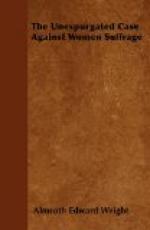Regarded from this point of view a Woman’s Suffrage measure stands on an absolutely different basis to any other extension of the suffrage. An extension which takes in more men—whatever else it may do—makes for stability in the respect that it makes the decrees of the legislature more irresistible. An extension which takes in any women undermines the physical sanction of the laws.
We can see indications of the evil that would follow such an event in the profound dissatisfaction which is felt when—in violation of the democratic principle that every man shall count for one, and no man for more than one—the political wishes of the large constituencies which return relatively few members to Parliament, are overborne by those of constituencies which, with a smaller aggregate population, return more members.
And we see what such evil finally culminates in when the over-representation of one part of a country and the corresponding under-representation of other portions has led a large section of the people to pledge themselves to disregard the eventual ordinances of Parliament.
If ever the question as to whether the will of Ulster or that of the Nationalists is to prevail is brought to the arbitrament of physical force, it will be due to the inequalities of parliamentary representation as between England and Ireland, and as between the Unionist and Nationalist population of Ulster.
The general lesson that all governmental action ought to be backed by force, is further brought home to the conscience when we take note of the fact that every one feels that public morality is affronted when senile, infirm, and bedridden men are brought to the poll to turn the scale in hotly contested elections.
For electoral decisions are felt to have moral prestige only when the electoral figures quantitatively represent the physical forces which are engaged on either side. And where vital interests are involved, no class of men can be expected to accept any decision other than one which rests upon the ultima ratio.
Now all the evils which are the outcome of disparities between the parliamentary power and the organised physical force of contending parties would “grow” a hundredfold if women were admitted to the suffrage.
There would after that be no electoral or parliamentary decision which would not be open to challenge on the ground that it was impossible to tell whether the party which came out the winner had a majority which could enforce its will, or only a majority obtained by the inclusion of women. And no measure of redistribution could ever set that right.
There may find place here also the consideration that the voting of women would be an unsettling element in the government of the State, forasmuch as they would, by reason of a general lack of interest in public affairs, only very; seldom come to the poll: would, in fact, come to the poll in full strength only when some special appeal had come home to their emotions.




